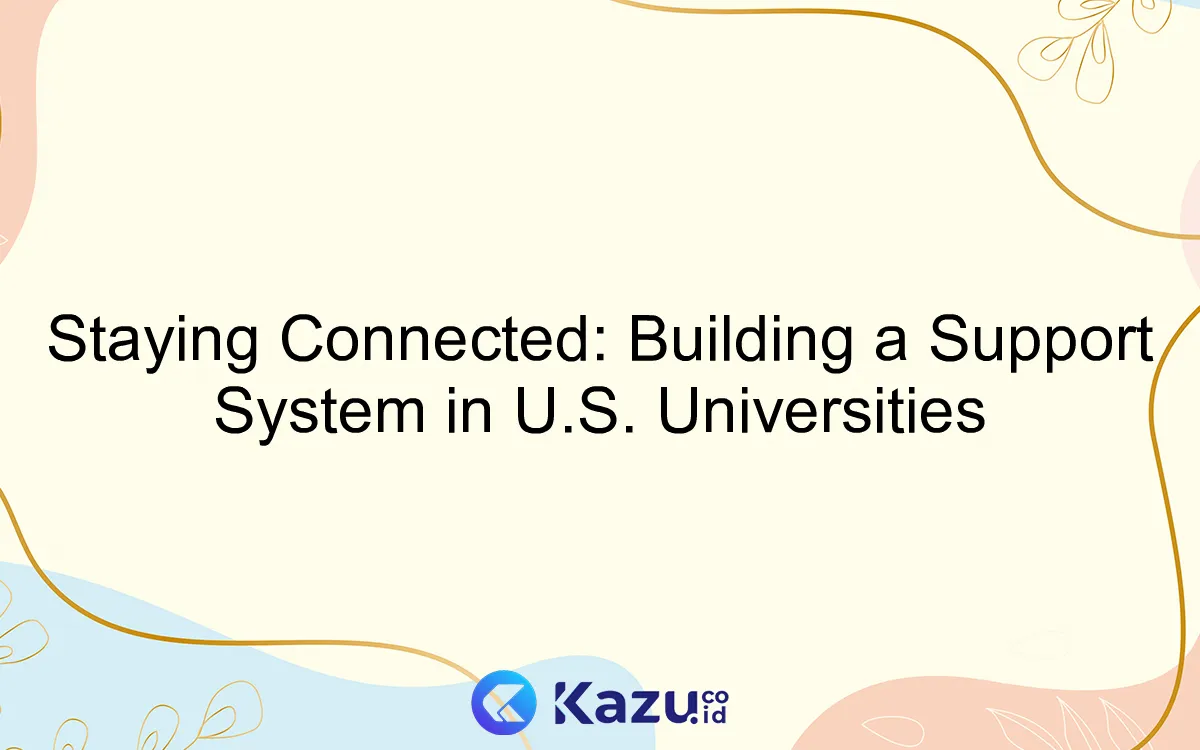Building a strong support system is vital for international students studying in U.S. universities. In this article, we will explore the importance of staying connected and provide insights on how to establish a reliable network of friends, mentors, and resources during your academic journey.
Getting Involved in Campus Clubs and Organizations
Being an international student in the United States can be an exciting yet challenging experience. One of the key ways to navigate this transition effectively is by building a support system within your university. One of the best ways to do this is by getting involved in campus clubs and organizations.
1. Find your interests
Take some time to explore the various clubs and organizations available on campus. Look for ones that align with your passions, hobbies, or academic pursuits. This will ensure that you join a community that shares your interests and values.
2. Attend club fairs
Most universities hold club fairs at the beginning of each semester. Attend these events to learn more about the clubs and organizations available, meet current members, and gather information about their activities. This is a great opportunity to ask questions and get a sense of which clubs align with your goals.
3. Join professional associations
If you are studying a specific field, consider joining professional associations related to your major. These associations often provide networking opportunities, workshops, and conferences that can enhance your academic and career prospects.
4. Engage in volunteering
Participating in volunteer activities allows you to give back to your community while also meeting like-minded individuals. Many universities have volunteer programs or community service clubs that organize regular volunteering opportunities. By participating, you can make a positive impact and connect with others who share your commitment to helping others.
5. Take on leadership roles
Once you have settled into a club or organization, consider taking on leadership roles. This can provide you with valuable experiences in managing teams, organizing events, and developing your leadership skills. Such experiences can greatly enhance your resume and future career prospects.
Remember, getting involved in campus clubs and organizations is not just about making friends or padding your resume. It is a way to build a support system, establish connections, and find a sense of belonging in your university community. So, take the initiative, explore your options, and make the most out of your time as a student in the United States.
Forming Relationships with Classmates and Professors

When studying at U.S. universities, it is essential to build a strong support system to thrive academically and personally. One of the key components of this support system is forming meaningful relationships with your classmates and professors.
Connecting with Classmates:
Getting to know your classmates is crucial in creating a sense of community and fostering a supportive environment. Here are a few ways you can form relationships with your fellow students:
- Participate actively in class discussions and group projects. This not only helps you to contribute meaningfully but also allows you to interact and collaborate with your peers.
- Join student clubs and organizations related to your interests. These groups provide excellent opportunities to meet like-minded individuals and form lasting friendships.
- Utilize social media platforms or university forums to connect with classmates outside of the classroom. This can help in organizing study groups or simply getting to know each other better.
Building connections with Professors:
Developing positive relationships with professors is beneficial for academic growth and networking opportunities. Here are some strategies to establish connections with your professors:
- Attend office hours to seek clarifications, ask questions, or discuss course material. This demonstrates your commitment to learning and allows professors to understand your interests and goals.
- Participate actively in class and show enthusiasm for the subject matter. Professors appreciate engaged students and will be more likely to invest their time in helping you succeed.
- Seek opportunities to work as a research assistant or join extracurricular projects led by professors. This not only allows you to gain hands-on experience but also strengthens your relationship with them.
The Benefits of Building Relationships:
Forming relationships with classmates and professors offers a multitude of benefits. These include:
- Academic support: Your classmates and professors can help you understand complex concepts, offer study tips, and provide additional resources.
- Collaborative learning: Working with classmates on projects and assignments enhances your understanding and fosters critical thinking and teamwork skills.
- Professional networking: Developing connections with professors opens doors to mentorship, recommendation letters, and potential research or career opportunities.
- Personal support: A strong support system is essential for emotional well-being while studying abroad. Building relationships can alleviate homesickness and provide a sense of belonging.
In conclusion, taking the time to form relationships with classmates and professors is crucial in creating a support system during your time at U.S. universities. By actively engaging with your peers and faculty, you can enhance your academic experience, broaden your network, and find emotional support when needed.
Utilizing Social Media for Networking
In today’s digital age, social media has become an integral part of our lives. Not only does it allow us to connect with friends and family, but it also provides a wealth of opportunities for networking. This is especially true for international students studying in U.S. universities.
Staying connected and building a support system is essential for a successful academic journey. Social media platforms such as Facebook, LinkedIn, and Twitter offer various ways to connect with fellow students, alumni, and professionals in your field.
By joining university groups and communities on social media, you can stay updated on events, workshops, and career opportunities. These platforms also provide a platform to showcase your skills and achievements, which can attract potential mentors, collaborators, or even job offers.
Furthermore, social media allows you to expand your network beyond the confines of your campus. Through online forums and professional groups, you can connect with individuals from different universities, industries, and backgrounds. This diverse network can provide valuable insights, advice, and support throughout your university journey.
However, it is important to remember that social media networking should be approached strategically. It’s essential to maintain a professional and positive online presence, as your digital footprint can affect your future career prospects. Be mindful of what you post, engage in meaningful discussions, and make genuine connections.
In conclusion, social media platforms offer a powerful tool for networking and building a support system in U.S. universities. Embracing these platforms can open doors to new opportunities, connections, and experiences that can enhance your academic and professional journey.
Seeking Support from International Student Services
As an international student, one of the most crucial aspects of your experience in a U.S. university is building a strong support system. This support system not only helps you navigate the academic challenges but also provides you with the necessary emotional support to thrive in a new environment. One valuable resource that can assist you on this journey is the International Student Services (ISS) office.
1. Academic Guidance and Resources
The ISS office offers various academic services to support international students in their educational endeavors. They provide guidance on course selection, academic policies, and academic success strategies. Additionally, they can connect you with tutoring services, study groups, and workshops to enhance your learning experience.
2. Visa and Immigration Assistance
Understanding the complex visa and immigration regulations can be overwhelming for international students. The ISS office is equipped with professionals who specialize in immigration matters. They can provide accurate information, guide you through the visa application process, and help you maintain legal status during your stay in the United States.
3. Cultural Adjustment Support
Adapting to a new culture can be challenging, but the ISS office is here to help. They offer orientation programs, workshops, and cultural activities to help you adjust to your new surroundings. Additionally, they can connect you with student organizations and clubs that cater to your cultural background, providing a sense of familiarity and community.
4. Counseling and Personal Development
Coping with the demands of university life can sometimes be overwhelming. The ISS office provides counseling services, either through trained professionals or referrals to mental health resources on campus. They strive to ensure your well-being by promoting personal development and fostering a safe and inclusive environment for all international students.
5. Networking and Social Opportunities
The ISS office organizes a range of social events and activities throughout the year, offering opportunities for international students to network, make friends, and celebrate their cultural heritage. These events foster a sense of belonging and help you create lasting connections with fellow students from all over the world.
Conclusion
In conclusion, building a strong support system is crucial for international students in U.S. universities. Engaging with campus resources, joining student organizations, and cultivating relationships with peers can help alleviate feelings of isolation and enhance academic and personal success. By actively seeking connections and support, international students can navigate the challenges of studying abroad and thrive in their academic journey.
